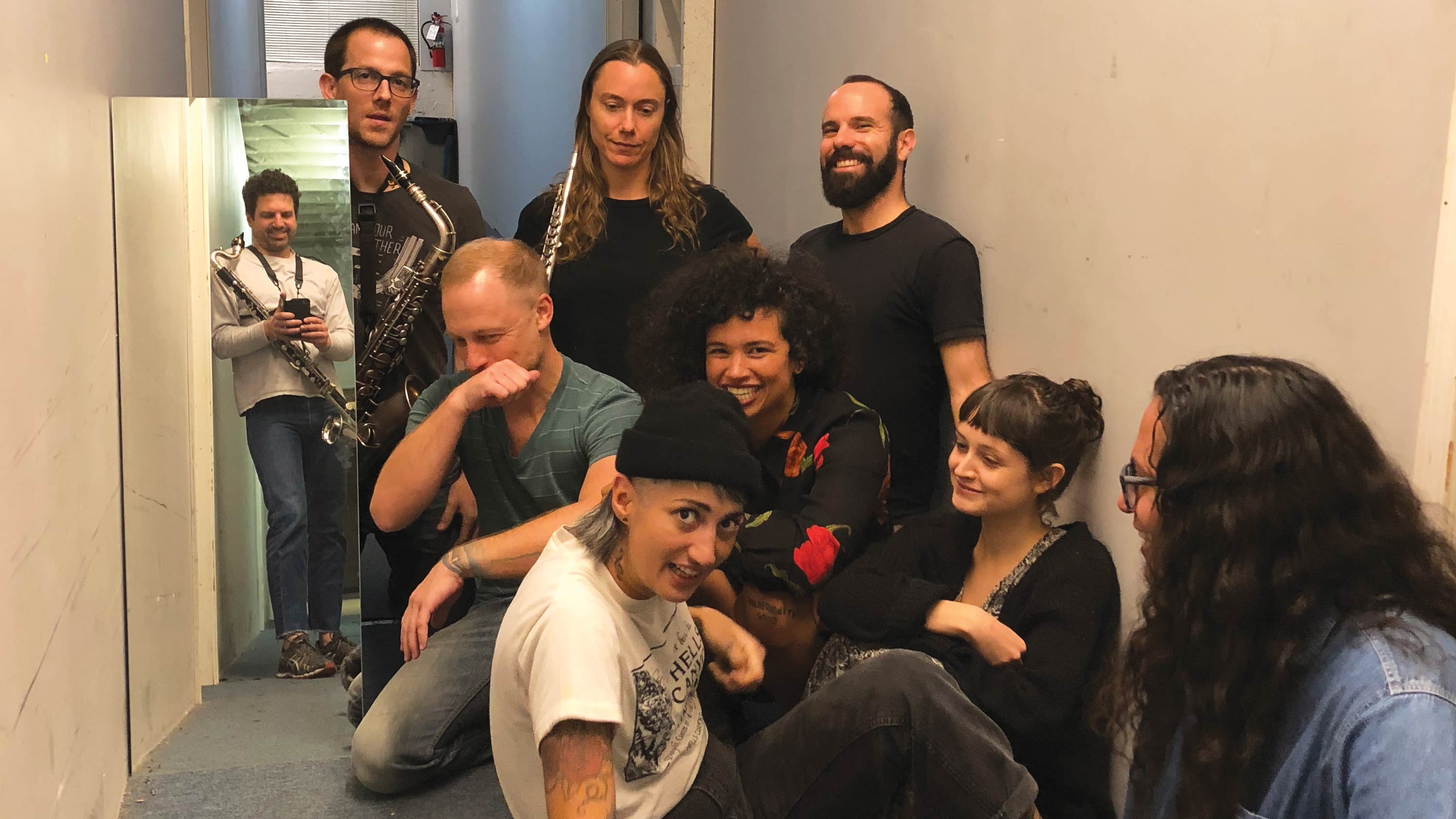Orchestra Becomes Radicalized was born from tragedy.
Portland composer John Niekrasz was living in Paris in 2015, when a mass shooting broke out in the offices of the French satire weekly Charlie Hebdo. Since he lived just a few blocks away, Niekrasz's neighborhood swarmed with emergency responders and news teams. The city was in lockdown—there was nothing to do but listen to the chaos outside and wait for news.
"It was just police sirens and funeral church bells for days," Niekrasz recalls outside his Portland home, a charming, weathered co-op with a community garden and a modest herd of goats. "[Those sounds] would become the palette for that first piece in 2015. I was like, 'This isn't just for me. This needs a bigger group. This is an orchestra.'"
All his musical life, Niekrasz had been writing for duos. But the music the Paris experience inspired felt as if it required a bigger arsenal of musicians. Once he returned to the States, he gathered players to perform a composition based on Niekrasz's time in Paris called the Reward Cycle.
Thus was born Orchestra Becomes Radicalized, the beautifully anarchic brainchild of improvisational drummer and poet Niekrasz, which uses important moments of 20th-century resistance as a sort of creative and ideological lighthouse to guide his troupe of 11 musicians. The second composition, 502, was about the Zapatista uprising. The third composition, which will be performed this week at Holocene, was inspired by leaflets written by Sophie Scholl and the White Rose collective, which opposed Hitler's Third Reich in early 1940s.
"[The collective] published these leaflets challenging the Third Reich very explicitly," Niekrasz says. "They were students in their 20s And they were caught, and [Sophie] was pointedly defiant until they killed her with a guillotine. It just struck me how relevant this stuff still is, unfortunately."
The orchestra isn't just inspired by radical ideas, its function itself is radical. There is no true leader—all members share dominance as the orchestra moves through the compositions Niekrasz designs.
This latest iteration of the orchestra is its least-defined version. The new work isn't titled like the first two were. "This movement feels more nebulous," Niekrasz says. "I felt like there was something disingenuous about naming the piece ahead of time before getting together with everyone."
OBR's purpose is to make music without hierarchy. Although Niekrasz builds the composition, he does this loosely, allowing ample space for other players' strengths to inform the music.
Striving for non-hierarchical form is more than just the project's mission statement. "[Stripping away hierarchy] feels like such an ingrained value to me," Niekrasz says. "I live in this cooperative, I participate in a goat co-op. Non-hierarchical cooperation just feels right to me. Of course, sometimes there are mediators and people who push the ball along or initiates something without a strong hand over the top of it."
For Maxx Katz, founder of the flute-centered doom-metal band Floom and one of the newest members of OBR, combatting hierarchy in the group can offer a lesson in how to exist in the world.
"Improvisation is such a great playground for the model of social relating," Katz says. "You have to express your individual voice and listen across a larger group at the same time. It's not necessarily that no one is dominant. A dominant voice rotates."
Sharing the spotlight—or dominant voice—is elemental to the ethos of OBR. So it's critical for the composition to be as loose as possible, and for the collective to have a flexible barrier of entry.
"You don't have to be a great sight reader," Niekrasz says. "You can be yourself and use your strengths and your gifts and your stories and share that. That's important to me."
It's easy to dismiss a non-hierarchical orchestra as a minor act of resistance. But for Niekrasz, art has a crucial role in any uprising.
"I think it's T.C. Bambara who said, 'The role of the artist is to make the revolution irresistible,' and I love that," says Niekrasz. "Is art enough? Probably not. It's the best thing I have to share right now."
SEE IT: Orchestra Becomes Radicalized plays Holocene, 1001 SE Morrison St., holocene.org, with Brown Calculus, on Wednesday, Sept. 5. 8:30 pm. $8-$10. 21+.
